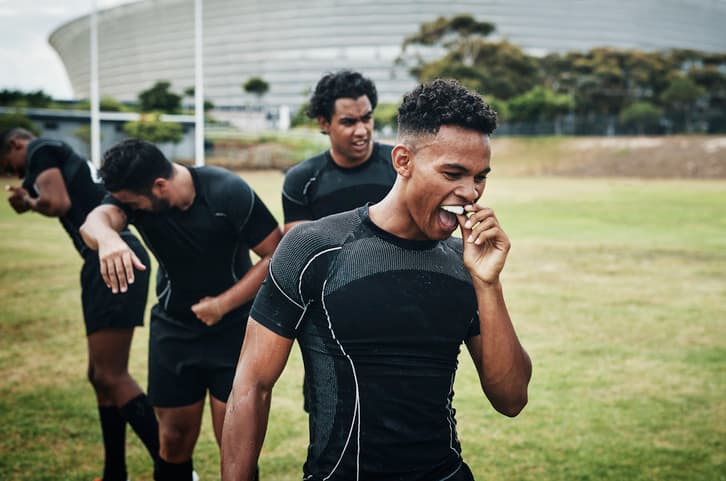
Fortunately, learning how to protect your teeth when playing a sport or participating in close-contact recreational activities isn’t as difficult as the frequency of these incidents suggests.
Protecting Your Teeth
1. Mouth Guards
Two pieces of equipment can go a long way toward protecting your teeth when playing a contact sport as physical as football, soccer or hockey. The first is a mouth guard – a must when you play any type of sport that involves bats, balls, sticks or person-to-person contact. You can find relatively inexpensive mouth guards for sale over the counter, most of which are designed to be one size fits all. Some of these are meant to be soaked in boiling water, then sculpted to fit your oral cavity in particular. Although both options can be easy on your wallet, however, generic or “boil-and-bite” mouth guards don’t offer the best fit and can be uncomfortable. For this reason, a personal but more expensive option is to have your dentist create a custom mouth guard that starts with a basic dental visit.
2. Helmets
The second item is a helmet, particularly one with a faceguard. Sturdy headwear gives you an extra layer of protection in sports such as football or hockey – which usually require this item. Note that it’s a good idea to choose the right helmet for the sport you are playing so that it will provide the appropriate amount of protection. A helmet designed for cyclists, the LA Times once explained, isn’t a good option when you’re about to play football. By the same token, a football helmet might be too heavy when playing baseball.
Solo Sports
Keep in mind you should know how to protect your teeth, mouth and head even when participating in solo sports such as bicycling, skiing and skating as well. Whereas there is no risk of you being hit in the tooth with a ball, bat or other person’s arm when on a bike or pair of skis, you still face the potential of falling and coming in contact with the hard ground. You can also run into something, such as a tree or parked car, leading to injury from low visibility on a narrow trail or sidewalk.
Always wear a helmet to protect your head when cycling, skating or skiing. Remember to choose the right kind for the sport for optimal protection. A mouth guard is also a good idea, as a helmet alone won’t shield your teeth.
Your dentist is your best resource for additional questions regarding how to protect your teeth during a given sport. He or she can ultimately help you choose the helmet that’s most appropriate and create a custom mouth guard to fit your teeth. Wearing a mouth guard for each day of practice might be a pain, but it’s a lot more comfortable than dealing with the dental injury that can follow.
